Key takeaways:
- Data privacy in genealogy is crucial for protecting the identities and personal histories of living individuals, fostering trust within families and communities.
- Challenges include navigating consent and managing data privacy, which requires genuine respect for others’ stories and understanding platform policies.
- Effective strategies for data management include regular backups, periodic reviews of privacy settings, and engaging with community resources for shared knowledge.
- Best practices involve encrypting sensitive data, minimizing personal information shared online, and using strong, unique passwords for account security.
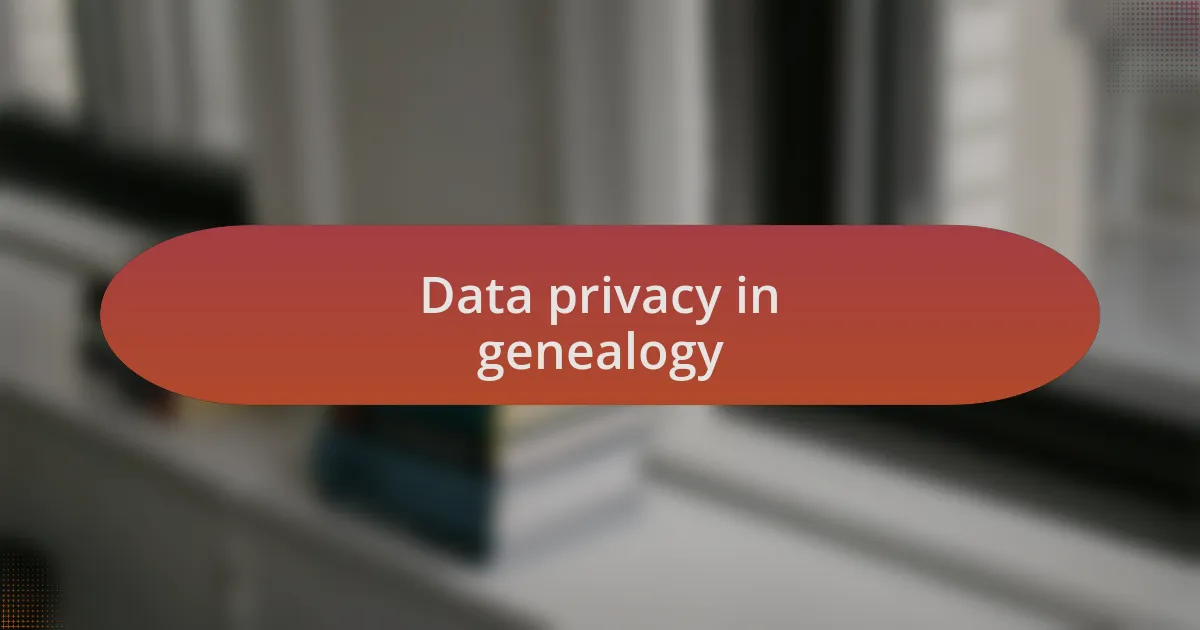
Data privacy in genealogy
When diving into genealogy, I often find myself reflecting on the delicate balance between uncovering family secrets and maintaining privacy. For instance, while researching my great-grandfather’s past, I stumbled upon sensitive information that could impact living descendants. It made me pause—how much of this should I share, knowing it could affect others’ lives?
As we compile data for our family trees, the ethical implications of our findings can weigh heavily on us. I recall a moment when I hesitated to include certain details about a relative’s past, understanding that it might paint them in a less favorable light. It made me wonder: how do we honor our ancestors while protecting their kin?
Navigating the complexities of data privacy in genealogy is not just about compliance; it’s about empathy. Sharing sensitive information can lead to unintended consequences, and the digital age only amplifies this risk. I often ask myself how I would feel if my life story were laid bare without my consent, reinforcing the importance of being thoughtful and responsible in our genealogical pursuits.
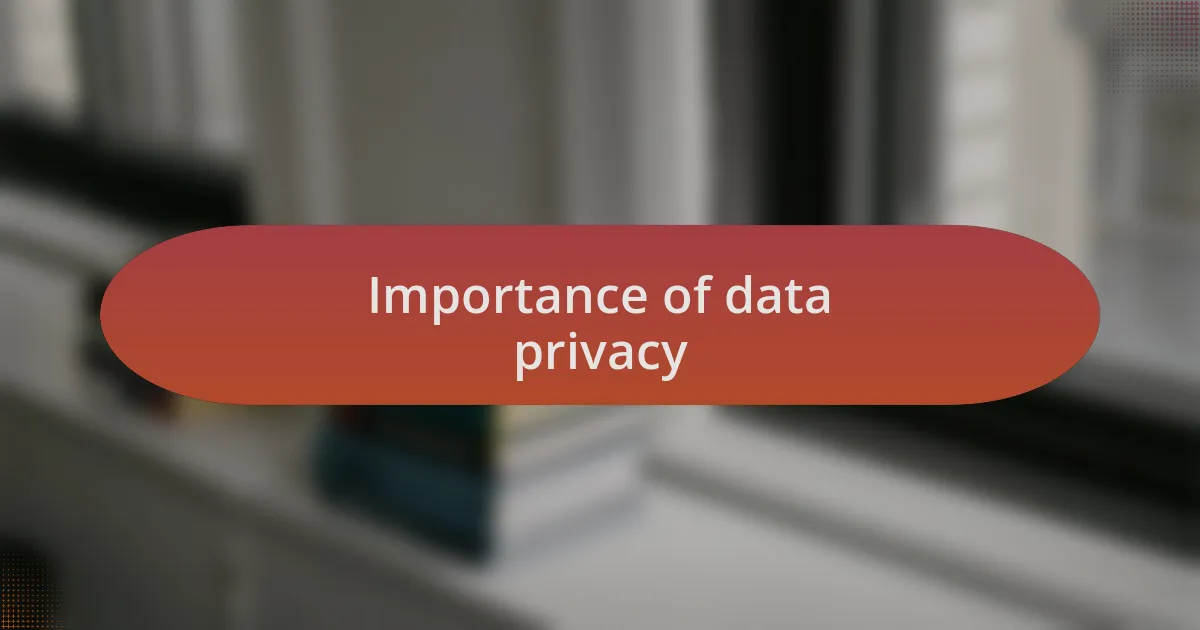
Importance of data privacy
Data privacy in genealogy is crucial because it protects the identities and personal histories of living individuals. I remember a time when I accidentally uncovered a living cousin’s confidential health history while researching. The realization hit me hard—how would I feel if someone unearthed such sensitive details about my life without my knowledge? This incident reinforced my belief that respecting privacy is essential, not just as a legal obligation but as a fundamental human decency.
Guarding personal data also fosters trust within families and communities. When I began sharing my findings with relatives, I noticed how cautious they were about disclosing their own stories. They wanted reassurance that their narratives would be treated with care. This experience made me appreciate that the way I handle sensitive information can either encourage or hinder openness in family conversations. After all, preserving trust in our genealogical journeys is vital for building strong connections with those we are researching.
Moreover, as our online presence grows, the threats to our privacy become more pronounced. Engaging with genealogy databases and social media can feel like walking a tightrope. I often ponder how much of my own story I’m willing to share versus what’s better left in the shadows. Keeping this balance in mind ensures that, while we explore our family histories, we also safeguard the personal realms of those still living, protecting their stories as carefully as we cherish our own.
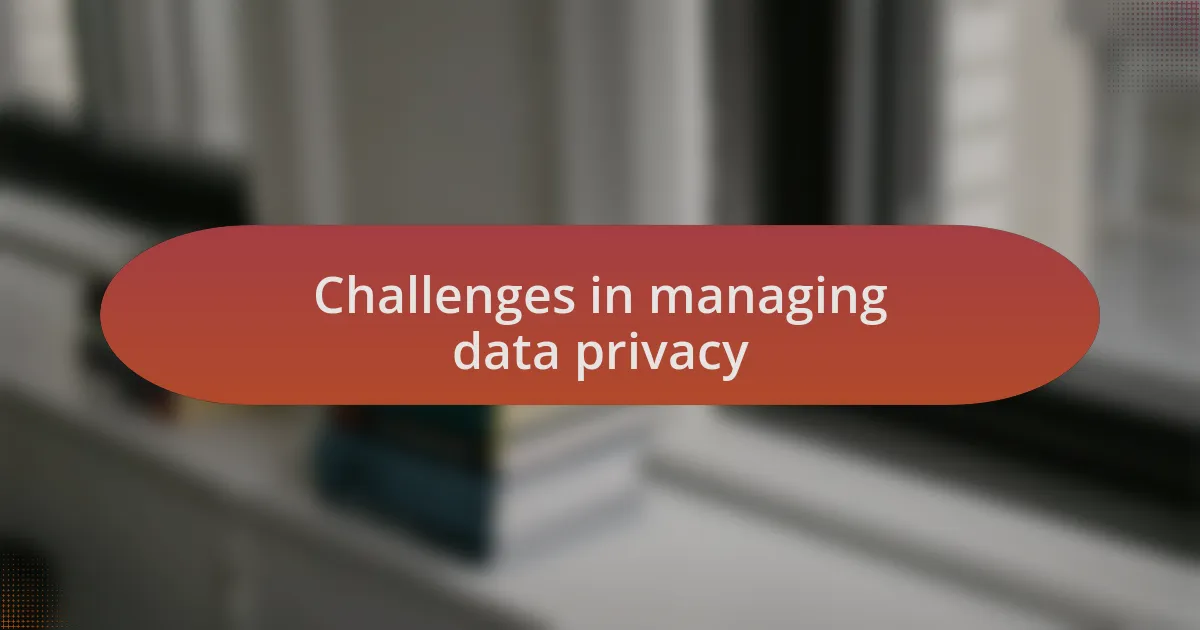
Challenges in managing data privacy
When I started diving deeper into my family’s genealogy, I quickly realized that not all data is easy to manage. One day, while utilizing an online forum, I accidentally stumbled upon discussions that included someone’s private family matters, unfolding stories that were entirely uninvited. It made me reflect on the fragile nature of privacy in our digital world—how much control do we really have over what’s shared and what remains hidden?
Another challenge I faced was navigating consent. I remember reaching out to a distant relative to share some findings, only to be met with a reluctance that caught me off guard. Their fear of what I might reveal made me contemplate my own motives. Isn’t it fascinating how easily we can forget that behind every piece of data lies a human story, filled with vulnerabilities? This interaction taught me that obtaining consent isn’t just about asking permission; it’s about fostering a genuine respect for someone else’s narrative.
As I worked with various genealogy software, I often encountered user policies that were difficult to interpret. One evening, after spending hours trying to figure out how my information was being stored, I found myself questioning if I could truly trust these platforms. The intricacies of data management feel daunting, doesn’t it? It’s an uphill battle to not only understand the technicalities but to ensure that I am doing everything possible to protect not just my data, but also that of my family members—whose stories deserve to be safeguarded just as fiercely.
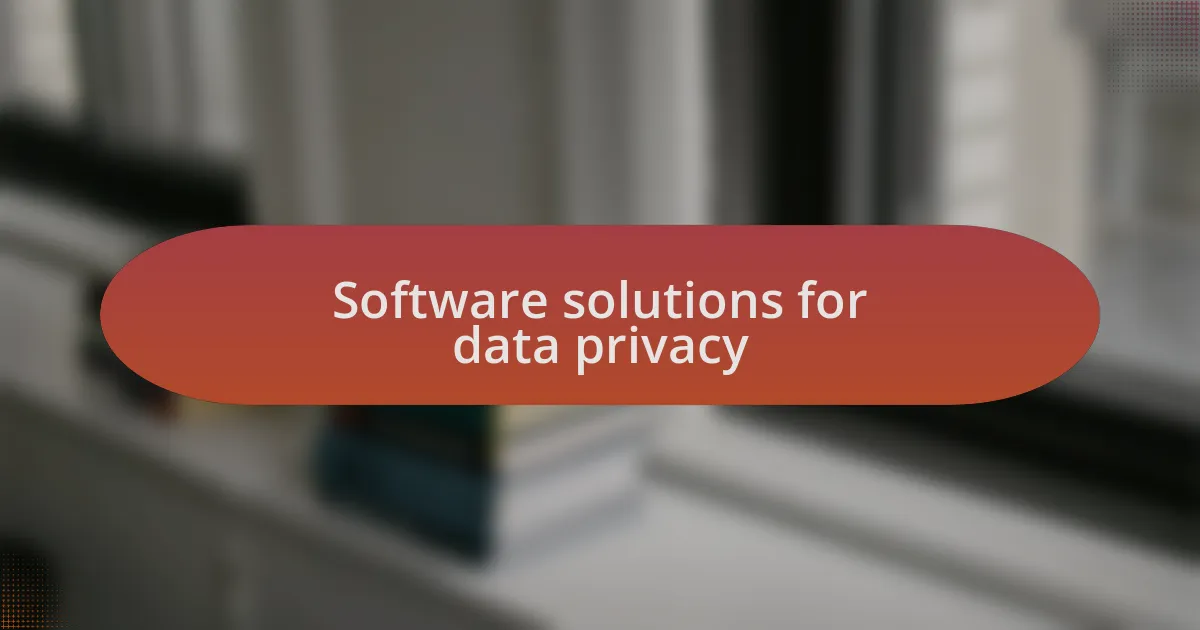
Software solutions for data privacy
While searching for ways to enhance my data privacy in the genealogy realm, I discovered several software solutions designed to protect sensitive information. For instance, I found platforms that enable encryption, ensuring that any data I uploaded was shielded from unauthorized access. Have you ever felt that rush of reassurance when you know your information is secure? Seeing that little padlock icon next to my files truly made a difference.
Another feature I appreciated was the option for customizable privacy settings. With one particularly user-friendly program, I could selectively share information with family members, tailoring what each person could see. It felt empowering to have that control—knowing that I was respecting my relatives’ preferences while still connecting with them. Wouldn’t it be great if every platform offered such thoughtful options?
Moreover, I came across software that included compliance tools, helping users understand their rights and obligations regarding data privacy regulations. This was a game-changer for me, as knowing my responsibilities and rights strengthened my approach to managing my family’s information. How often do we really think about the legal aspects of our data? Embracing those tools gave me the confidence to navigate the sometimes murky waters of data privacy with clarity and accountability.
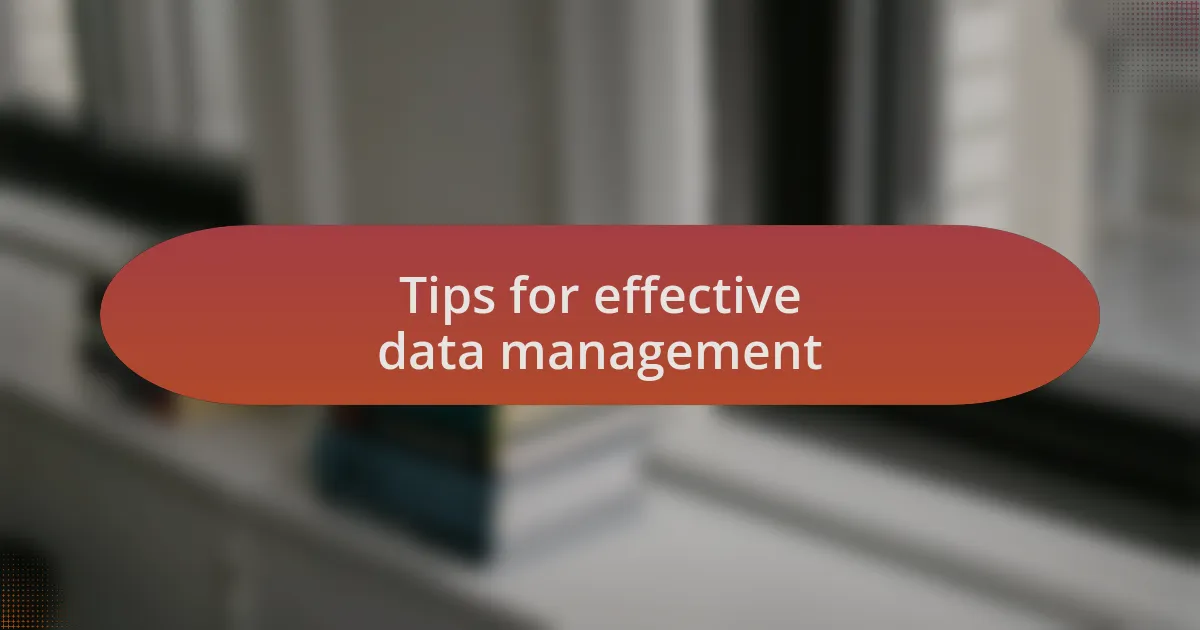
Tips for effective data management
One effective strategy I’ve implemented is regularly backing up my data. I remember how I felt when I inadvertently lost some vital genealogical research due to a software glitch. Since then, I’ve made it a priority to create multiple backups, storing them in different locations. It’s like having an insurance policy for my family history—it provides peace of mind knowing that my work is safe.
Another tip I can’t stress enough is to review and update your privacy settings periodically. The digital landscape evolves rapidly, and new features or policies can impact how your information is handled. I once neglected this step and discovered that I was sharing more than I intended on a specific platform. Now, I set reminders to check my settings every few months—it’s a small effort that pays off in safeguarding my family’s details.
Lastly, engaging with community forums and resources has proven invaluable. I learned so much from others who have navigated similar challenges. Just the other day, someone shared a tip about using two-factor authentication for added security. It’s that sense of camaraderie and shared knowledge that not only enhances my data management but also instills a sense of trust in the tools I use. Have you ever connected with others in your field? Those discussions can illuminate paths you hadn’t considered before.
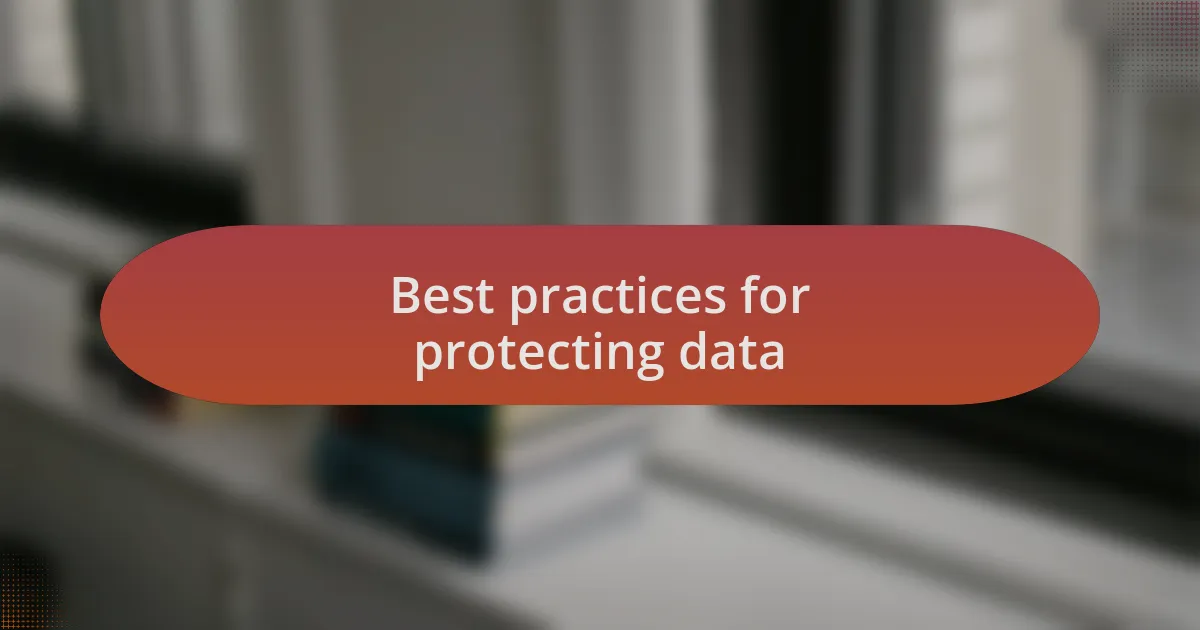
Best practices for protecting data
One best practice I’ve adopted is encrypting sensitive data. When I first started diving into my family history, I stored everything on my computer without much thought to security. However, after hearing of a friend’s experience where their research was compromised due to a security breach, I realized that simply having a password wasn’t enough. By using encryption, I’m able to feel a sense of security, knowing that even if someone accesses my files, they won’t easily decipher my private information. Have you considered how vulnerable your data might be?
Another key strategy is minimizing the amount of personal information I share online. Reflecting back on a time when I filled out extensive online forms for genealogy sites, I wish I’d been more cautious. Each field I filled out felt like a leap of faith, but it was a learning moment. By limiting the data I provide to what’s absolutely necessary, I reduce my risk and maintain a tighter grip on my family’s privacy. It makes me wonder—what personal details are you unwittingly giving away?
Lastly, I find it crucial to use strong, unique passwords for each of my accounts. I still remember the sinking feeling when I realized I used the same password across several platforms, which ultimately led to a security scare. Now, I use a reliable password manager to generate and store my passwords. It’s a lifesaver! I often ask others about their password habits, and it’s surprising how many people still overlook this fundamental step. Are your passwords strong enough to stand up to potential threats?